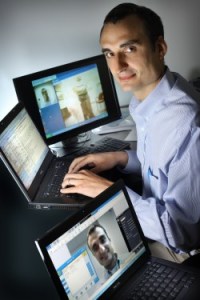The University of Rochester Clinical and Translational Science Institute’s associate director for Clinical Trial Methods and Technologies, Ray Dorsey, M.D., M.B.A., co-authored a review article in the New England Journal of Medicine published this week. The review suggests that the growth of telehealth, a patient-centered initiative for electronic distribution of health-related services and education, will have a profound impact on the delivery of health care in the coming decades.

Ray Dorsey, M.D., M.B.A.
Dorsey, who is also the director of the Center for Human Experimental Therapeutics at the University of Rochester Medical Center, and his co-author Eric Topol, M.D., at the Scripps Research Institute, believe telehealth will reduce the cost and increase the convenience of health care. Instead of waiting 20 days to secure a 20-minute appointment that, with travel time factored in, could take up two hours, patients could have a virtual visit with their physician almost any time of day in the comfort of their own home.
Telehealth is growing rapidly and its use has expanded from treating acute conditions, like stroke, to episodic and chronic conditions, like ear infections and Parkinson’s disease. Likewise, the application of telehealth has spread from hospitals to clinics, and finally to patients’ own mobile devices.
In fact, Dorsey and his colleagues at the University of Rochester developed a mobile phone application to remotely assess symptom progression and medication effectiveness in Parkinson’s disease patients. This application is part of the first national randomized controlled trial of telehealth in Parkinson’s disease, led by Dorsey. That trial, which will be completed later this summer, will determine the effectiveness of using video calls to connect Parkinson’s patients with expert care.
While telehealth has potential to provide basic health assessments to previously unreachable patients, Dorsey and Topol acknowledge that it will not replace traditional office visits. However, if properly harnessed, these new technologies will help providers and health care systems meet the growing burden of chronic diseases, increase access to care, and return health care to its patient-centered roots.
For a related article, click here.
To read the full review, click here.
